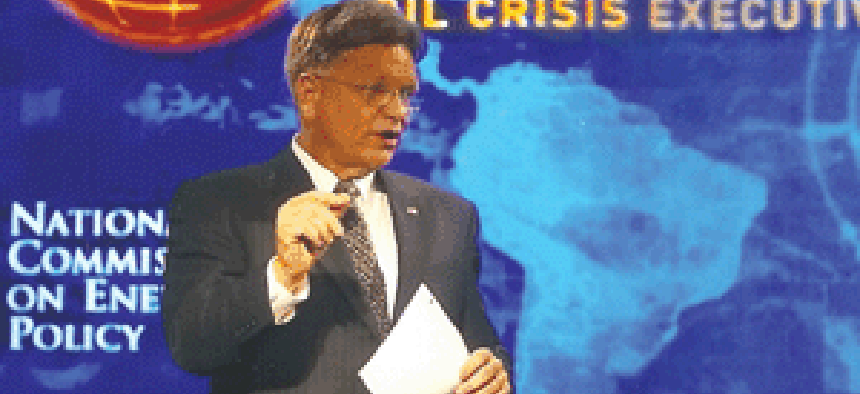Survival Guide: Perspectives from the field

Randall Larsen occasionally wreaks havoc on the nation with small pox outbreaks, terrorist strikes that drive oil prices up to $154 a barrel, and anthrax attacks on our food supply.
Randall Larsen occasionally wreaks havoc on the nation with small pox outbreaks, terrorist strikes that drive oil prices up to $154 a barrel, and anthrax attacks on our food supply.But these are just games for the 55-year-old retired Air Force colonel and the government and corporate leaders who play them.Larsen is the founder and director of the Institute for Homeland Security, which develops and runs crisis simulation programs with names such as Atlantic Storm, Oil Shock Wave and Dark Winter.He spoke with Staff Writer Roseanne Gerin about the role of IT and contractors in the war on terror. You say that America lacks an anti-terrorism strategy. What kind of strategy should we have? We must have the right spending priorities. Now, we seem to be chasing our tail. We like to stay one step behind the terrorist. They hijack airplanes, and then we do lots of stuff to make sure they can't hijack airplanes. That's the wrong way to go about this.Our priorities should be on two threats that could destroy America and change it forever: nuclear and biological weapons. What is the role of IT in the war on terror? Information is the weapon that terrorists fear most. It's where we have the greatest asymmetric advantage over them. The technology exists to integrate all of the federal information systems, which is kind of a radical idea that some people say we can't do. Which technologies do you mean? If we had used data mining before Sept. 11, then when Mohammed Atta and his roommate checked in at the airport in Maine, it immediately would have popped up that Atta's roommate was on the terrorist watch list.Within a few seconds, it would have popped up that four other guys checking in for flights that morning had listed Mohammed Atta's address in Florida when they bought their tickets.Three other names would have been identified, because in the previous three months they had made calls to Mohammed Atta's house; two other names would have popped up, because they had used Mohammed Atta's frequent-flier number to buy their tickets a month earlier.We would have grabbed 11 guys Sept. 11, before they ever got to the door. How can the Homeland Security Department spend money more efficiently on counterterrorism efforts? Of the money we spend to prevent a nuclear attack on America, 70 percent of it should be on programs that prevent terrorists from getting nuclear material. A lot of it is in the former Soviet Union, but we also have to worry about Pakistan, Iran and North Korea. Twenty percent should focus on detecting if terrorists get their hands on it, and 10 percent on response.The bad thing may happen, so we have to figure out how to respond to it. Now, it seems like the departments are focused on putting all of these radiological detectors on borders. They don't work very well. And if you had a nuclear weapon, would you bring it through a major seaport? I wouldn't. Then why are you a big supporter of DHS Secretary Michael Chertoff? Because he's not a politician. He's a career bureaucrat, and I really like his approach. The day after the bombing in London July 7, he came out and said we're not going to drop everything and go spend a lot of money defending subways.He said we must focus on the big ones, meaning nuclear and biological weapons. He won me right there with that one sentence. What can our country learn from the way that the United Kingdom responded to the bombings in London? We can learn from the leadership of Tony Blair -- we're not going to overreact. A friend of mine is a retired British military intelligence officer who, very late July 7, sent me an e-mail that said: "Yes, it's been a bit of a dust-up over here today, [but] we did not make any changes to the big cricket match that was going on." What are the ramifications of overreacting? Our over-reaction causes us enormous problems. Look at all the money we paid out to the families of the Sept. 11 victims. ... Are we going to do that every time there is a terrorist attack? This could get really expensive.And why should they get it when the folks in the 1993 [World Trade Center] attack didn't get it, and the [victims of the attack on the Alfred P.] Murrah Building [in Oklahoma City] didn't get it? It was a huge overreaction that set a terrible precedent.

WT:
Larsen:
WT:
Larsen:
WT:
Larsen:
WT:
Larsen:
WT:
Larsen:
WT:
Larsen:
WT:
Larsen:

Randy Larsen
Institute for Homeland Security
WT:
Larsen:
WT:
Larsen:
WT:
Larsen:
WT:
Larsen:
WT:
Larsen:
WT:
Larsen:
WT:
Larsen:
NEXT STORY: Bumper crop of contracts awaits firms